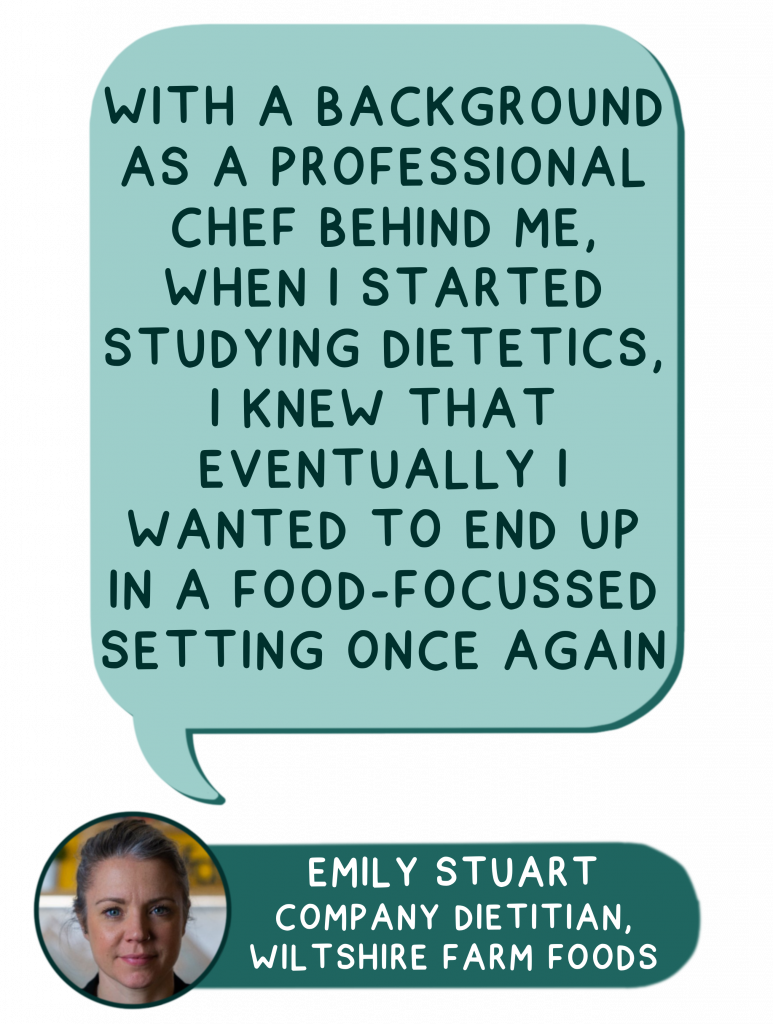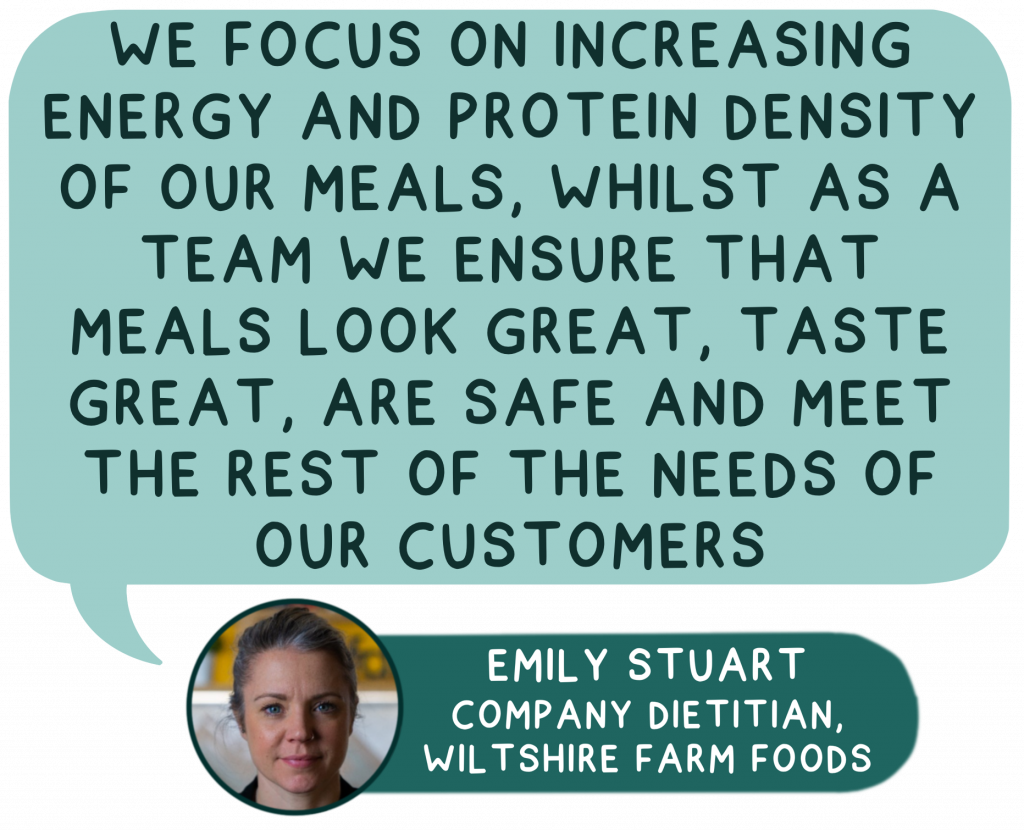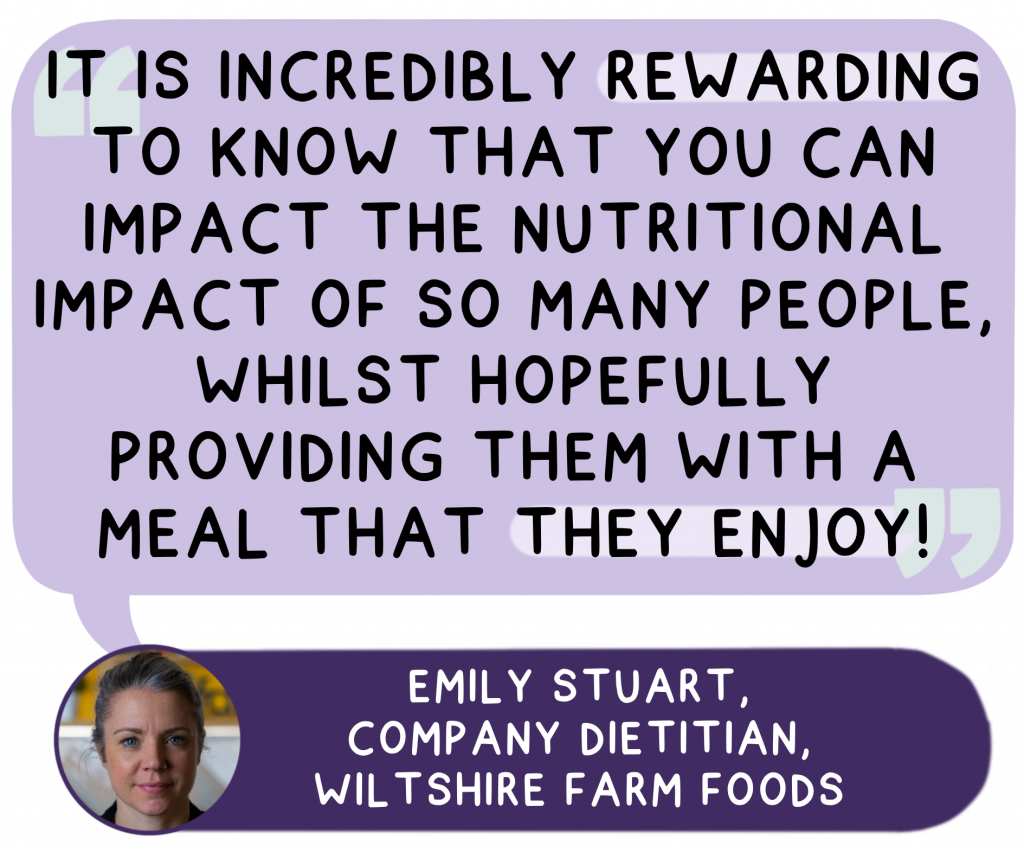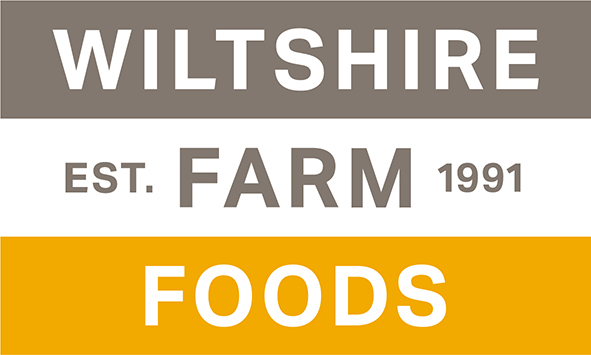 By Emily Stuart, Registered Dietitian
By Emily Stuart, Registered Dietitian
Written in collaboration with the healthcare professional support team at Wiltshire Farm Foods.
How much of the food you eat or buy as part of your weekly shop is produced within the food industry? None of it, some of it or most of it? This will, of course, be different for everyone but I’m willing to bet that for a lot of us it’s a fair amount of it. From tinned goods to dairy products, from ready meals to cereal and grain products, and from desserts, cakes, and sweets to your favourite weekend pizza – so much of the food we buy and enjoy is produced within the UK’s food and drink industry. The food and drink industry is the UK’s biggest manufacturing sector by turnover and is valued at £104.4 billion, making it larger than the automotive and aerospace industries combined. However, it is not an area where many of the dietetic workforce are based professionally. Nutritionists, more so, but there are certainly fewer dietitians in this sector, despite the British Dietetic Association (BDA) recognising that there is growing demand for dietitians to work in different areas aside from the more common clinical route.
But food and dietetics – they go together well, don’t they? I certainly think so! Despite this being an area where dietitians could have more status, along with registered nutritionists we are starting to see more representation of nutrition professionals in this sector. Specialist groups such as Nutritionists in Industry and the Nutrition Committee of the Food and Drink Federation exist, and the BDA have the Food Services Specialist Group (FSSG) that has members from industry settings, and there is even a newly formed Industry Specialist Group.

You could argue that when you start to consider the manufacture of foods intended for groups with specialist dietary and nutritional needs, the benefit of having a dietitian on board increases further. This is what attracted me to my role as Company Dietitian for the food manufacturer apetito. Apetito are the leading producer for food into the health and social care sector, via provision of food into hospitals, care homes, local authority ‘Meals on Wheels’ and for people living in their own homes, via Apetito’s sister company, Wiltshire Farm Foods. Apetito also produce texture modified food, other specialist ranges, and provide food into education settings, so it’s fair to say that we cover a lot of the population with the meals that we produce! With a background as a professional chef behind me, when I started studying dietetics, I knew that eventually I wanted to end up in a food-focused setting once again. I saw the role come up and I just went for it. I started initially as maternity cover, and then once that was over, I spent some time doing some other dietetic work. When the permanent role came up, I was again keen to continue progressing my carer in this area, so I joined the business again.
Thinking about making the switch?
For anyone interested in a nutrition career within the food industry, a lot of the expected advice for how to go about this applies, such as trying to get some relevant work experience, but it’s also good to think outside the box. The roles won’t necessarily be advertised in the places you’re used to looking, so it’s good to start following some of the companies that you might want to work for and signing up to their job posting updates. You can always reach out to them too – particularly if a company produces a specialist food type that is intended for people with certain clinical conditions as they may well be looking for more nutritional expertise in their area. Have a think about what skills and knowledge you can offer outside of dietetics – perhaps you have some business or sales experience? Or perhaps you have worked in food service, catering, or development before? What about your clinical speciality – increasingly we are seeing specialist food ranges or functional products hit the shelves, such as foods to support good gut health or lower cholesterol. If you are someone who has worked with the group of people who these products will be aimed at, then you’re likely to be a good candidate to work with these products as a dietitian.
A typical day working in the food industry
 It may be a cliché, but what I love about my role at apetito is that no two days are the same. Just like when you are working as a clinical dietitian and are meeting and supporting patients with varying needs, I’m fortunate to work on lots of different projects with varying focuses. My role sits within the New Product Development (NPD) team and is supported by a Graduate Dietitian. Together, we cover all the business units and work hard to ensure that the nutrition of the products that the NPD team produce and launch into the market are as nutritionally suitable as they can be. Because we work with some of the most vulnerable people in society, this is incredibly important. We focus on increasing energy and protein density of meals, whilst as a team we ensure that the meals look great, taste great, are safe and meet the rest of the needs of our customers. It can be a balancing act, trying to get everything where you want it to be, but it is incredibly rewarding to know that you can impact the nutritional intake of so many people whilst hopefully providing them with a meal that they enjoy.
It may be a cliché, but what I love about my role at apetito is that no two days are the same. Just like when you are working as a clinical dietitian and are meeting and supporting patients with varying needs, I’m fortunate to work on lots of different projects with varying focuses. My role sits within the New Product Development (NPD) team and is supported by a Graduate Dietitian. Together, we cover all the business units and work hard to ensure that the nutrition of the products that the NPD team produce and launch into the market are as nutritionally suitable as they can be. Because we work with some of the most vulnerable people in society, this is incredibly important. We focus on increasing energy and protein density of meals, whilst as a team we ensure that the meals look great, taste great, are safe and meet the rest of the needs of our customers. It can be a balancing act, trying to get everything where you want it to be, but it is incredibly rewarding to know that you can impact the nutritional intake of so many people whilst hopefully providing them with a meal that they enjoy.
Specialist Nutrition is also a huge focus of what we do. As apetito produce texture modified (TM) meals for people living with dysphagia, we must make sure that those meals are not only nutritionally suitable and promote dining with dignity, but also that they are safe. We develop all our TM meals in line with the International Dysphagia Diet Standardisation Initiative (IDDSI) Framework, working tirelessly to enhance the dining experience of those living with dysphagia.
Working with NPD is just one element of the role. Working for a business within the food production industry means that dietetic support is also needed for Public Relations and marketing, teaching, public speaking and supporting sales teams. There is a lot of customer-facing work, whether that be to answer customer queries, present to customers on our ranges or even supporting with feedback and research on how our customers perceive the nutrition messages that we share with them. I get the opportunity to travel to visit customers and present at trade shows and conferences, and to contribute to other exciting areas of work such as sustainability. I am responsible for our nutrition policies and get the chance to contribute to the wider business policy areas, such as food policy and NPD procedures. So, you could say that a typical day is never quite typical. I might be working on a few of these things at once, whilst maintaining my core focus on the food and the products that we produce, which is exactly why I enjoy this job so much.

Dietetics is an exciting field to work in and we see new roles in unique areas added to the jobs you could do all the time. To hear more about what it’s like working as a dietitian in industry, listen to our latest Dietitian Diaries podcast episode on Apple podcasts or Spotify. If you are interested in working in the food industry as a nutrition professional, I hope this blog has given you some insight into what the role might entail, and given you some ideas of how you might go about finding a role in this sector.
Want to find out more about Wiltshire Farm Foods? Take a look at their range of texture modified meals.
Written in collaboration with the healthcare professional support team at Wiltshire Farm Foods.

Disclaimer: This blog has been developed in association with the healthcare professional support team at Wiltshire Farm Foods. Approval of each sponsor and activity is carefully assessed for suitability on a case by case basis. Sponsorship does not imply any endorsement of the brand by MyNutriWeb, its organisers, its moderators or any participating healthcare professional, or their association. Sponsorship funds are reinvested into the creation and promotion of professional development opportunities on MyNutriWeb.







Great perspective! Thank you for the info.